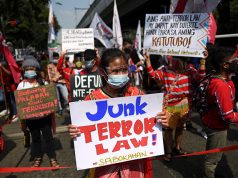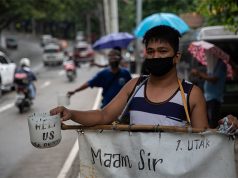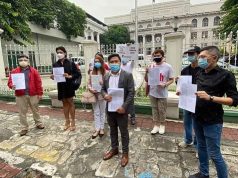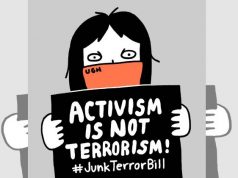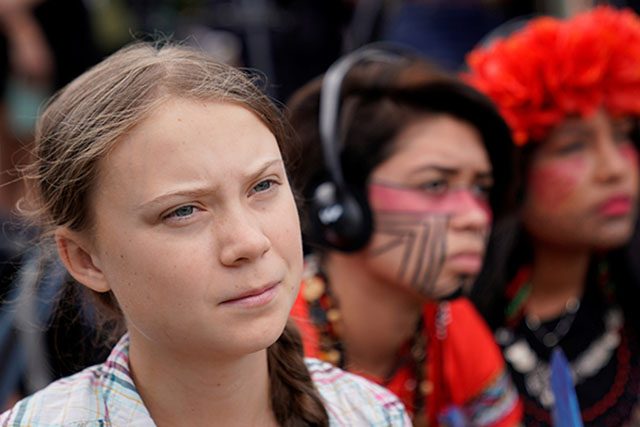
Swedish teen climate activist Greta Thunberg on Tuesday urged local and international environmental allies to sign a petition to have the Philippines’ controversial anti-terror law be repealed.
The 17-year-old activist renewed her calls to junk the Anti-Terrorist Act of 2020 in an Instagram post where she shared her support for Filipino environmental and climate activists who have expressed their fears against the newly-signed measure.
Thunberg shared the link of the online petition on her bio which has so far received more than 17,600 digital signatures.
Notable signatories include:
- Kevin Bracken — Convenor, International League of Peoples Struggle Commission on Environmental and Climate Justice
- Beverly Longid — Global coordinator, International Indigenous Peoples Movement for Self-Determination and Liberation
- Naderev Saño — Executive director, Greenpeace Southeast Asia
- Hannibal Rhoades — Communications and advocacy coordinator, The Gaia Foundation
- Daniel Aldana Cohen —Director, Socio-Spatial Climate Collaborative at University of Pennsylvania
“Support environmental and climate activists in the Philippines!
The Philippines’ new Terror Law puts environment & climate activists in the country at risk,” Thunberg wrote.
“The proposed Anti-Terrorism Act of 2020 undermines constitutionally protected rights to political expression and dissent by equating activism with terrorist activities that are defined under the law. We call on local & international allies to sign this petition to have the Terror Law repealed,” she added.
Thunberg also included the hashtags “#JunkTerrorLaw” and “#DefendTheDefenders” in her post, which has garnered more than 300,000 likes on the image and video-sharing platform.
Last week, she also tweeted her support to have the anti-terror law be revoked. She then retweeted a solidarity post of Friday For Future, an international movement she started in 2018.
RELATED: Why Swedish climate activist Greta Thunberg supports campaign to junk anti-terror law
Last June 4, members of the Center for Environment Concerns-Philippines expressed fears that the newly-signed law would potentially aggravate attacks against them since it grants the state forces sweeping powers in terms of tackling supposed security threats.
The Youth Advocates for Climate Action Philippines shared a Twitter thread that detailed the potential consequences of the anti-terror law. Part of it reads:
“Our environment and land rights advocates, in particular, have already been the subject of trumped-up charges, threats, physical attacks, and killings before all this, and we can only expect that the Anti-Terrorism Bill will only make things worse for our environmental frontliners. All forms of activism and dissent are being threatened including climate activism.”
In 2018, Global Witness, an international watchdog for environment and corruption, reported that the Philippines is the most dangerous place for environmental activists and indigenous communities.
Controversial provisions
Law and civic organizations, activists and experts have expressed strong opposition against the anti-terror law that is feared to potentially stifle dissent and curtail constitutionally-protected civil liberties.
Some of its provisions include the legalization of wiretapping, granting warrantless arrests without redress of grievances, being detained for up to 24 days without charges and having a vague definition of terrorism.
Critics said that while the anti-terror law does not stop people from dissenting or criticizing the government “in essence,” it only applies if those activities “are not intended to cause death or serious physical harm to a person, to endanger a person’s life, or to create a serious risk to public safety.”
Law experts and lawmakers have filed at least eight petitions before the Supreme Court to challenge the anti-terror law’s constitutionality. Petitioners also include the framers of the current 1986 Philippine Constitution, the highest law of the land.
Last month, House Speaker Alan Peter Cayetano said that the Congress is willing to repeal the anti-terror law if critics turned out to be right with it being prone to abuse.
“At kayo pong mga kritiko, we appreciate your criticism, but, in this case, we hope that you are wrong. And if you are not wrong at any point in time, we can amend or repeal,” he said.
Laws can be repealed if courts declare it to be inconsistent with the Constitution. It can either be repealed by the Congress or if there are “occurring inconsistencies on all points between a prior and subsequent law.”
One of the laws that were repealed due to its perceived infringement on the constitutional rights of an individual was the Cold War-era Anti-Subversion Law that criminalized being a communist.
“The anti-subversion law was ‘buried’ a long time ago for it was proven that such policy, aside from being prone to abuse and a tool to harass, undermined some of our basic constitutional rights,” Senate Minority Leader Franklin Drilon previously said.





